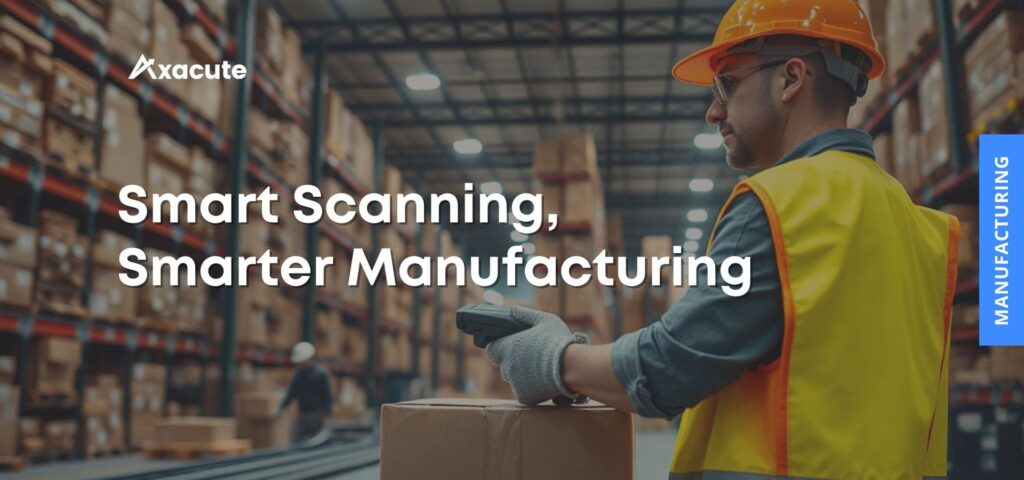Smart Scanning, Smarter Manufacturing

Image from Canva
Manufacturing has come a long way from simple manual processes. Today, barcode technology plays a big role in making operations faster and more accurate. When combined with smart scanning, it can transform how factories track, manage, and control their products. Companies that embrace the latest barcode solutions gain a real edge, staying competitive in a crowded market. Smart scanning isn’t just about reading codes; it’s about turning data into a powerful tool for better decisions and smoother workflows.
The Role of Smart Barcode Scanning in Modern Manufacturing
The Evolution of Barcode Technology
Barcode technology started with basic lines to identify products. Over time, it’s grown into a sophisticated system with 2D codes and RFID tags. These advancements let us store more data in smaller spaces, making inventory management much easier. IoT connects these scanners directly to systems, giving real-time updates. Today’s smart scanners talk to production software, giving factories instant data on what’s happening on the floor.
Impact on Production Efficiency
Thanks to barcode scans, companies can cut down manual entry errors. Tasks like tracking raw materials, finished goods, or parts get faster and more accurate. Studies show that barcode scanning can reduce errors by up to 80%. This means less rework, less waste, and faster delivery times. Smooth information flow is now routine, helping managers make smarter choices and stay on top of deadlines.
Case Study: Manufacturing Plants Transforming Operations
Look at automotive giant Toyota. They used smart barcode scanning to track parts from warehouse to assembly line. This changed their entire process, making everything run more smoothly. Even Amazon uses smart barcode systems to keep their warehouses quick and accurate. These examples show how smart scanning isn’t just a trend — it’s a game changer, improving both speed and accuracy.
Key Components of Smart Barcode Scanning Systems
Hardware Innovations
Today’s scanners are tough, fast, and connected. They come in portable handheld options or fixed vision systems. Rugged devices can handle dust, drops, and rough environments. Plus, many are wireless, so workers can scan from anywhere. Faster scanning means orders are filled quicker and errors drop.
Software and Integration
Smart barcode systems talk directly to business apps like ERP or MES. This connection lets data flow automatically, showing real-time inventory levels or production status. Analytics tools help managers see trends and plan better. If you want a truly efficient operation, your scanning system needs seamless software integration.
Data Management and Security
All this data is stored securely, using encryption to stop breaches. Companies need to follow standards that keep data private, especially when it involves suppliers or customers. Regular backups and cybersecurity tools protect information and ensure operations never stop unexpectedly.
Benefits of Smart Barcode Scanning in Manufacturing
Enhanced Accuracy and Reduced Errors
Manual data entry can be full of mistakes. Smart scanners drastically cut this down, often reducing errors by over 50%. Fewer mistakes mean fewer delays, less waste, and happier customers. It also frees workers from tedious paperwork, letting them focus on more important tasks.
Increased Manufacturing Flexibility
Smart barcode systems support just-in-time production and quick changes on the fly. Want to switch to a new product line? It’s easier when your system instantly updates stock levels and orders. Companies become more adaptable and ready to handle new challenges or customer demands.
Improved Supply Chain Transparency
With real-time data on inventory, companies can better plan and forecast. This info helps avoid stockouts or overstocking. For example, a retail chain can see exactly which items are running low and reorder right away. Better visibility means fewer surprises and more control over supply.
Cost Savings and ROI
Brands that adopt smart barcode scanning see big savings. They cut labour costs by automating manual tasks, reduce waste, and avoid rework. Most companies see a return on investment within a year. The initial outlay pays off quick with increased efficiency and fewer errors.
Challenges and Solutions in Implementing Smart Barcode Scanning
Common Barriers
High setup costs, staff training, and tech incompatible with existing systems can slow things down. Security worries also come up when handling sensitive data. These hurdles might seem intimidating, but they’re manageable with the right approach.
Strategies for Successful Deployment
Start with a clear plan: assess your needs and set goals. Roll out the system step-by-step, trying it out in one area before scaling up. Train staff well, so they’re excited and comfortable using the new tools. Look for solutions that follow industry standards, making future upgrades easier.
Overcoming Integration and Adoption Hurdles
Work with experienced vendors who understand manufacturing. Their advice can help you avoid common pitfalls. Using cloud backup and keeping security tight will protect your data from threats, making the transition smoother.
Future Trends in Barcode Technology and Manufacturing
Integration with IoT and AI
Imagine factories that operate more like autonomous agents. IoT sensors combined with AI can predict failures before they happen or suggest ways to optimise production. This is the future they are working towards — smarter, more proactive systems.
Advances in Barcode Technologies
New forms of barcodes like holographic or 3D codes will hold more data and be harder to copy. Also, scanner hardware becomes even faster and more reliable. Better connectivity keeps data flowing, no matter where you are.
Regulatory and Standardisation Developments
Global standards are evolving to make sure all these systems work well together. Data security rules will tighten, so manufacturers must be ready to protect sensitive information. Staying current with these rules helps avoid costly compliance issues.
Conclusion
Smart barcode scanning is transforming how manufacturing works. It boosts accuracy, speed, and transparency, helping companies stay competitive. Moving forward, integrating these tools with IoT and AI will take productivity even higher. Companies that start small — maybe with a pilot project — can see the huge benefits without risking too much. The message is clear: investing in smart barcode solutions makes your operations smarter and more agile. Adapt now, or fall behind.
Categories
- Axacute Highlights (3)
- Blog (146)
- Distribution (4)
- Features (5)
- Industry (2)
- Inventory (67)
- Manufacturing (72)
- Production (33)
- Technology (30)
- Warehouse (66)
- Wholesale (2)
Related
Benefits of an Inventory Management System
The Hidden Costs of Manual Inventory Management for SMEs
Improve Inventory Management and Cut Waste with Axacute
Real-Time Warehouse Alerts: How to Prevent Stockouts
Connect Axacute to Your ERP for Smarter Operations
Intelligent Warehouse Setup
Unlocking Cost Savings in Production with Axacute
Level up your productivity
Get started with Axacute and improve your business operations.







